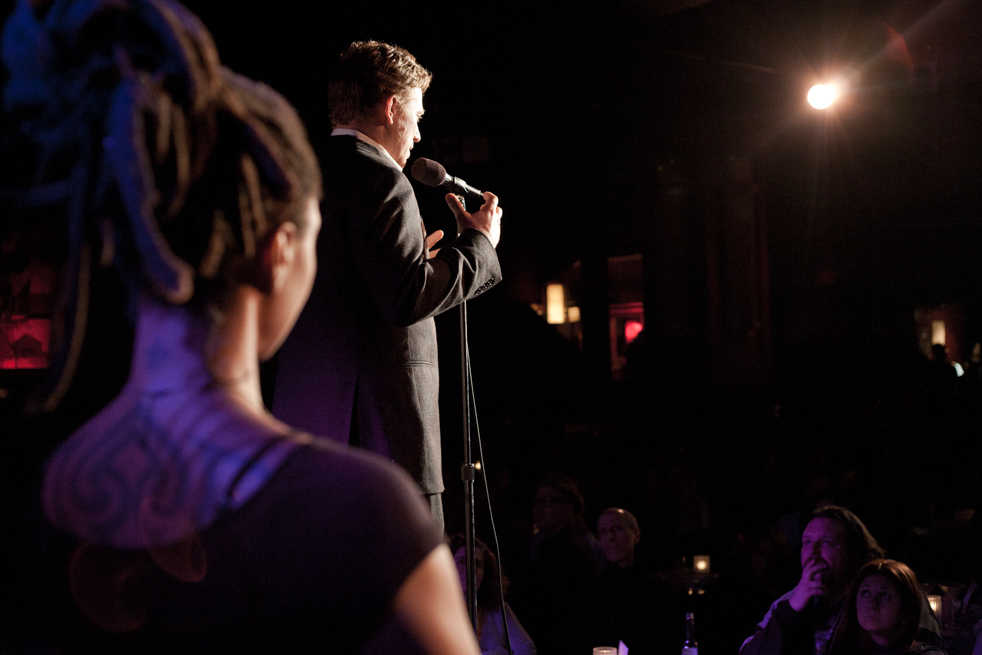In March, the Moth returned to its Georgia roots by spreading its popular StorySLAMs to Atlanta. True stories, performed without notes in front of live audiences, are the focus of the Moth, which now includes a podcast, radio hour, two books and education programs.
St. Simons Island native George Dawes Green, a novelist and poet, began the Moth in 1997 after moving to New York City. He missed swapping stories on the back porch with his friends, who called themselves “The Moths” after the insects that shared the porch with them.
The main events of the Moth today are Mainstage and StorySLAMs. The slams are open mic nights of five-minute stories on a certain theme. A host keeps the unpredictable night flowing, and the audience votes on the winner. Mainstage events feature five curated speakers who have been coached by Moth staff to shape their stories.
Senior Director Jenifer Hixson is one of the people who helps storytellers prepare to share during the Mainstage shows. She often finds people to coach at StorySLAMs. Hixson also is one of the hosts of the radio hour, which is aired on over 450 stations.Stories for the podcast and the radio hour are chosen from the StorySLAMs.
Hixson and her team came to Georgia less than a year ago to meet with Meredith Williams, who produces the Atlanta StorySLAMs, and auditioned hosts. They found John Good to guide the monthly events, held at Dad’s Garage.
With the theme of “First,” the inaugural StorySLAM included stories of a man on a waterski who was terrified of the aquatic animals around him, which turned out to be dolphins not sharks; a kid who shared his spelling bee failure with the word “garage” and a woman’s experience of death in the family and coming out. The last story, shared by Theresa Davis, won the night.
“You have a great talent pool in Atlanta,” said Hixson. She attended the first Atlanta slam and left impressed by the heartfelt, funny and sad stories. She became involved with the Moth 18 years ago as a volunteer at a Moth Mainstage show. In these early days, only a few people were on staff, and the slam events had not yet begun.
An overwhelming number of stories were being pitched for the Mainstage event, so they began StorySLAMs, involving the audience in the decisions. While the Moth staff will listen to stories that do not win, there is a beauty in seeing people’s different favorites, according to Hixson.
Transferring the live, spoken stories to print for the two Moth books was an “interesting process.” “Some stories work better on the page than they do live, and some we love live — it’s so much the person’s personality carrying the story. Without their inflection and their vibrancy, it didn’t translate well,” Hixson said.
“The ideal way to see a Moth story is to hear it live in a room, if you can. If you can’t, then I think you should hear it [on the podcast or radio hour]. Because a person’s voice brings so much extra to a story,” Hixson added. The medium of live storytelling has a documentary quality, and the lack of notes removes a potential filter.
“Of course, someone could read a story to you, but it really feels different when they don’t have the piece of paper there. Even if they’re stumbling through it, it feels more like a conversation. Though the audience isn’t saying much back, they are with their presence, with their laughter, with their silence,” Hixson explained.
Hixson, herself, has experienced storytelling on a Moth stage. Telling a deeply personal story was scary, but “it felt good to share the story.” She felt “so much love from the audience,” appreciating their silence. She stayed in the character she was at the time of the story’s events, hoping that “someone will recognize their forgiving feeling towards someone who was wronging them.”
In today’s troubled times, stories play an important role in building empathy. “Stories help us connect the dots between each other. I feel like we’re at a rift right now; the country doesn’t understand each other,” Hixson said.
“Hearing a story coming from someone else, you can think something about a group — this group is like that — but then when you hear a story directly from that person, it’s a gamechanger. I’ve had my mind changed a lot by stories,” Hixson added.
To participate in the magic of live storytelling, on stage or in the audience, attend the next Moth StorySLAM at Dad’s Garage on Monday, Nov. 27. at 7:30 p.m. Tickets for the event go on sale a week before at 3 p.m. and typically sell out quickly.
The slam’s theme is control. For aspiring storytellers, Hixson suggested considering “why the story is important for you to get out into the world.” More than just an anecdote, most stories include a realization or catharsis, without being formulaic.
